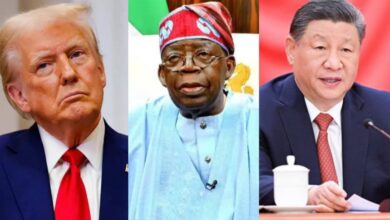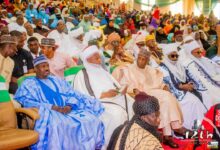FG asks Supreme Court to strike out interim order banning withdrawal of old Naira notes

The Federal Government of Nigeria has reacted to Wednesday’s ruling by which the Supreme Court of the country temporarily stopped it and the Central Bank of Nigeria (CBN) from withdrawing old Naira notes from the circulation stating that it will take steps to vacate the ruling, with reasons.
This was as the Attorney General of the Federation (AGF) and Minister of Justice, Mallam Abubakar Malami Thursday said, while the government would obey the apex court ruling, it would take necessary steps to set aside the interim order.
The Supreme Court had in a ruling on Wednesday suspended the CBN deadline for demonetisation policy and fixed February 15 for hearing on the matter.
Malami, while speaking during an interview on ARISE News Channel Thursday, clarified that the Federal Government, out of its regard for the rule of law, would abide by the order of the apex court, even though it intended to challenge it and would do so within the provisions of the law.
The comments by the minister came as, according to a media report, the Federal Government had filed reasons before the Supreme Court as to why the suit by three states challenging the February 10 deadline fixed by the CBN for phasing out the old N1,000, N500, and N200 banknotes should be struck out.
The CBN had, on Thursday, equally attributed the continued scarcity of new banknotes to hoarding in certain quarters.
However, the National Security Adviser (NSA), Major General Babagana Monguno, appealed to the House of Representatives to come up with practicable solutions to the attendant economic crisis arising from the scarcity of the redesigned naira notes.
Also a civil society group, the Alliance for Surviving Covid-19 and Beyond (ASCAB), reportedly advised the CBN to obey the order of the Supreme Court, which temporarily restrained it from going ahead with the plan to phase out the old banknotes from today, until after hearing on the matter.
A seven-member panel of the apex court presided by Justice John Okoro had on Wednesday temporarily stopped the CBN from effecting the scheduled ban of old naira notes in N200, N500 and N1,000 denominations from February 10.
The order was issued during a ruling on an ex parte application brought by Kaduna, Kogi, and Zamfara states against the AGF.
They had asked the court to issue an interim injunction against the government, pending the hearing and determination of their suit challenging the naira redesign policy of the CBN.
The three states argued, among others, that the policy had brought an excruciating situation upon the country and unless the Supreme Court intervened timeously there might be anarchy in the country.
According to them, since the announcement of the policy, there has been an acute shortage in the supply of the new naira notes in their states, thereby making it very difficult and nearly impossible for citizens to access the new notes.
While they argued that the notice period given by the federal government was inadequate, they claimed that the CBN did not follow laid down procedure for implementation of the policy.
In a short ruling, the apex court granted the interim order and restrained the federal government from banning the old naira notes, pending the determination of the suit. The Supreme Court subsequently fixed hearing for February 15.
But reacting to the interim order of the apex court, the AGF, while speaking with Arise News Channel yesterday, stated that it was within the right of the government to challenge any order it was not pleased with. He said the government would do so in this matter using the instrumentality of the law.
Malami stated, “The rule of law provides that there has to be obedience to the judgement and orders of the Supreme Court. The rule of law provides that when you are not happy with a ruling you can file an application for setting it aside and in compliance with the rights and privileges vested in us as a government, we are equally looking at challenging the order and seeking for it to be set aside.”
Malami disclosed that the federal government had already put machinery in place to challenge the jurisdiction of the apex court to hear the suit of the three states. He contended that the singular fact that the CBN was not joined as a party in the suit robbed the apex court of necessary jurisdiction.
He said when the court reconvened next Wednesday, the federal government, on one hand, would be challenging the jurisdiction of the apex court to entertain the suit, and on the other, see how the interim order would be vacated.
He said, “The order was granted by the Supreme Court and the order incidentally lapses on Wednesday, which is the day of the hearing, with that position in mind we have taken steps to file an objection challenging the jurisdiction of the court to entertain the matter.”
The minister explained, “Jurisdiction on the grounds that when you talk of monetary policy, regardless of the characters they take, the central bank is an indispensable and a necessary party for that matter.
“What we have at hand is a situation where the central bank was not joined as a party and if the central bank as an institution was not joined as a party, the position of the law is clear that the original jurisdiction of the Supreme Court cannot be properly invoked.
“So we have given considerations to diverse issues, inclusive of the issue of jurisdiction, and come Wednesday we will argue the case from that perspective, among others.”
Malami added, “I think what we are talking about is not whether the ruling is binding or not binding, we are talking about what we intend to do, there is no doubt about the fact that the ruling of the Supreme Court, regardless of the prevailing circumstances, is binding and then within the context of the rule of law.
“You can equally take steps that are available to you within the context of the spirit and circumstances of the rule of law.
“And what we are doing in essence is in compliance with the rule of law both in terms of obedience to the ruling and in terms of challenging the ruling by way of putting across our own side of the story, putting across our case, challenging jurisdiction.
“So the issue of obedience to the ruling of the Supreme Court is out of it. We are wholeheartedly in agreement that naturally, we are bound by it and will comply accordingly. But within the context of compliance, we shall challenge the ruling by way of filing an application seeking for it to be set aside, it is all about the rule of law.”
Specifically, the federal government, in its preliminary objection to the suit, insisted that the Supreme Court lacked the necessary jurisdiction to entertain the suit in the first place.
It was the argument of the federal government that the agency (CBN), whose Act was being complained about by the plaintiffs, was a statutory body with legal personality that could sue and be sued in its name.
In the Notice of Preliminary Objection filed by its lawyers, Mr Mahmud Magaji, SAN, and Tijanni Gazali, the respondent claimed that the suit of the three states ought to have been instituted before a Federal High Court and not the Supreme Court, as done by the plaintiffs.
Besides, the respondent argued that “the plaintiffs have equally not shown reasonable cause of action” against it.
In the 11 grounds of objection to the suit, the respondent stated that the plaintiffs were challenging the powers of the Federal Government of Nigeria through its agency, the CBN, to withdraw old banknotes and introduce new ones.
The AGF further posited that the plaintiffs’ suit was about the powers vested on the CBN by the CBN’s 2007 Act to call in its banknotes and introduce new ones.
The respondent also submitted that the suit as presently constituted fell under Section 251(1)(a)(p)(q) & (r) of the Constitution (exclusive jurisdiction of the Federal High Court) by virtue of the subject matter and parties.
While describing the instant suit as an abuse of judicial process, the AGF urged the apex court to strike out the suit in the interest of justice, adding that the plaintiffs will not be prejudiced if the preliminary objection is upheld.
The respondent submitted, “The plaintiffs have no grievance whatsoever against the Federation of Nigeria. This suit has disclosed no dispute that invokes this court’s original jurisdiction as constitutionally defined.
“This suit is an abuse of judicial process. The plaintiffs have no locus standi to institute this action. The plaintiffs have no reasonable cause of action against the defendant.”
Among the issues raised for determination are: whether having regard to the facts, it is the Federal High Court and not the Supreme Court that is vested with the exclusive jurisdiction to entertain this suit?
“Whether the provisions of Sections 17, 18 and 20(3) of the Central Bank (Establishment) Act, Laws of the Federation of Nigeria, 2004 to do not exclude the jurisdiction of the Supreme Court in view of the reliefs claimed?
“Whether the plaintiffs have the locus standi to institute this suit and have disclosed any cause of action against the Defendant.”
In the event the issues raised are decided in favour of the federal government, then the apex court should make an order striking out the suit, the respondent sought.
The reasons presented by the federal government as to why the court should set aside its ruling were contained in a preliminary objection to the suit filed by filed Mr. Mahmud Magaji and Tijanni Gazali, lawyers representing the AGF, who is the sole respondent in the suit.
Scarcity caused hoarding – CBN
The CBN attributed the continued scarcity of new naira banknotes to hoarding by certain persons in the country.
Director, Consumer Protection, CBN Ilorin Branch, Mrs. Rashidat Mongunu, made the disclosure during monitoring exercises of some microfinance banks at Offa, the headquarters of Offa Local Government Area of Kwara State.
The monitoring team first paid homage to the Olofa of Offa, Oba Mufutau Gbadamosi, before heading to Stockcorp Microfinance Bank and Ibolo Microfinance Bank.
Gbadamosi said the redesigned notes were already made available by the CBN, “but it is those hoarding it that makes it look scarce and people now throng banks to collect money almost at the same time.”
She said, “Because of the attitude of some Nigerians in hoarding the money, even those that don’t really need the money are rushing to get it and keep, not to spend.
“Currency management is a cycle, but we have not allowed the cycle to mature, because when you issue out currency as CBN, what we expect is that the naira issued out will come back into the banking system again.
“But now, everybody collecting the naira is hoarding it. So, no matter how much naira we put out there, if we continue with this attitude and the CBN issue from now till December, it will still not be enough.
“And you know that in every economy, you must have a proper accountability on the indent.
“You just don’t issue out naira for the fun of it, you issue the amount that is commensurate with the level of activity you have in that country.”
The CBN director added that the situation could only get better when people start spending money already hoarded because enough money was already in circulation.
Mongunu said, “There is naira out there, I have been in Kwara for over three weeks and we have been allocating money daily.
“The truth is that if the currency is circulating the way it should and not being hoarded, we shouldn’t have a problem.
“The only thing is for us to change our attitude because it can only get better when people start spending the money they have hoarded.”
She added that the CBN was already engaging traditional rulers to sensitive their people to have a positive attitude and be confident that the naira redesign policy was not to punish anyone but to better the economy.
In his remarks, the Olofa of Offa, Oba Gbadamosi, said the extension of the legality of the old notes from January 31 to February 10 was responsible for the problems people were facing currently. He said people had already deposited all that they had on them as of January 30, in anticipation of spending the new notes on February 1, hoping that it would be available, but it was not so.
The traditional ruler advised that if the CBN wanted the policy to be successful, it should make the new notes available for people to spend.
Task before NASS
The NSA, Maj. Gen. Babagana Monguno, appealed to the House of Representatives to come up with practicable solutions to the attendant economic crisis arising from the scarcity of the redesigned naira notes.
Monguno, who appeared before the House of Representatives ad-hoc committee on the policy of the CBN, said his office was also working on measures to assist the legislature in tackling the problem.
The committee in continuation of its meeting had invited the Minister of Finance, Zainab Ahmed; Managing Director, Nigerian Security, Minting and Printing Company, Ahmed Halilu; Chairman, Independent National Electoral Commission (INEC), Professor Mamoud Yakubu; and Director of Currency Operations of the CBN, to appear before it on Wednesday, but those invited gave excuses for their absence.
Represented by Rear Admiral Abubakar A. Mustapha, a director in charge of the secretariat that conducts general security appraisal of committee with special focus on elections and other security situations exigencies in his office, the NSA said the policy was affecting military operations in some areas, stressing that some soldiers on the battle fronts are having financial difficulties.
Speaking shortly before the press was excused for a closed door session, Monguno said, “Because of the sensitive nature of some of the information that will come, bordering on security, there are things you cannot say in the media.
But that being said, globally, military operations, even in the First World countries, such policies if not well thought out will affect some things because some of our soldiers are deployed in places where they cannot actually access digital means of paying whatever daily subsistence.
“One of the main issues that the NSA has been talking about is that this committee sits down and articulates better ways of addressing these issues and he has directed a committee in his office, which I am part of, to write out his position to assist the committee to meet its mandate. On more detailed level, I will be able to talk to the committee when the press leaves.”
Earlier in his remarks, the chairman of the committee, Hon. Alhassan Ado Doguwa, said the meeting was in line with the mandate given to them by the House to interface with relevant agencies on the naira redesign. He said the CBN policy was unpopular and had subjected Nigerian to untold hardship, adding that it is a threat to the general election.
Doguwa said, “For the records, this is a continuation of our duties and obligations as an ad hoc committee of the House of Representatives in the specified matter of redesigned naira notes and swap policy of the federal government.
“I believe members would recall that on the last day of our sitting before we went for break, on the submission of our report, the House through the Speaker gave this committee an extended mandate to continue to follow up this matter so as to see to the implementation of this very important policy effective.”
Doguwa said those invited that couldn’t appear before the committee yesterday, were expected to appear today, warning against dishonouring the invitation.
Briefing newsmen after the closed door session, Doguwa added that the committee would be forced to use the legislative instrumentality to cause appearance of any invitee that refused to honour the invitation.









